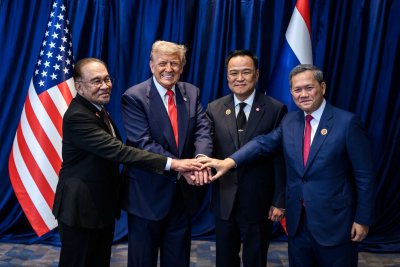U.S. lifts Biden-era arms embargo on Cambodia

Nov. 6 (UPI) — The United States on Thursday lifted a Biden-era arms embargo on Cambodia following several high-profile meetings between officials of both countries.
The notice filed by the State Department with the Federal Register that explains the Trump administration was removing Cambodia from the International Traffic in Arms Regulations list due to Phnom Penh’s “diligent pursuit of peace and security, including through renewed engagement with the United States on defense cooperation and combating transnational crime.”
The embargo was placed on Cambodia in late 2021 by the Biden administration to address human rights abuses, corruption by Cambodian government actors, including in the military, and the growing influence of China in the country.
It was unclear if any of those issues had been addressed.
“The Trump administration has completely upended U.S. policy toward Cambodia with no regard for U.S. national security or our values,” Rep. Gregory Meeks, D-N.Y., said in a statement criticizing the move to lift the embargo.
“There has been broad bipartisan concern about the Cambodian government’s human rights abuses and its deepening ties to Beijing.”
The embargo was lifted on the heels of Deputy Prime Minister Prak Sokhonn meeting with Michael George DeSombre, U.S. assistant secretary of State for East Asian and Pacific Affairs, in Cambodia on Tuesday.
On Friday, Secretary of Defense Pete Hegseth met with Tea Seiha, another Cambodian deputy prime minister, in Malaysia, where the two agreed to restart “our premier bilateral military exercise,” the Pentagon chief said in a statement.
President Donald Trump has received much praise from Cambodia for his involvement in securing late July’s cease-fire and then last month’s peace declaration between Thailand and Cambodia, which had been involved in renewed armed conflict in their long-running border dispute.
During Tuesday’s meeting between Prak and DeSombre, the Cambodian official reiterated Phnom Penh’s “deep gratitude” to Trump “for his crucial role in facilitating” the agreements, according to a Cambodian Foreign Ministry statement on the talks.
Meeks framed the lifting of the embargo on Thursday as the Trump administration turning a blind eye to Cambodia’s “rampant corruption and repression … because the Cambodian government placated Trump in his campaign for a Nobel Peace Prize.”
“That’s not how American foreign policy or our arms sales process is meant to work,” Meeks said.
Cambodia in August nominated Trump for the Nobel Peace Prize “in recognition of his historic contributions in advancing world peace,” the letter to the Norwegian Nobel Committee stated.
